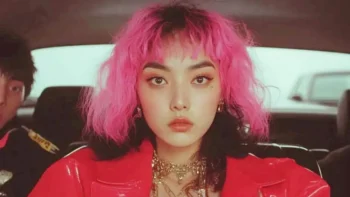By Gary Symons
TLL Editor in Chief
Rapper and music producer Timbaland has launched an AI entertainment company, Stage Zero, which will manage its first ‘signee’, an AI pop artist named TaTa (pictured above).
In doing so, Timbaland has also plunged the rest of the world into a Black Mirror episode that — unlike TaTa — is unfortunately very real.
Stage Zero, co-founded by Rocky Mudaliar and Zayd Portillo, is essentially combining the ‘Virtual Influencer’ concept that TLL wrote extensively about in 2020, with new AI tools that allow users to create music and lyrics with generative AI, and then pair that music with a lifelike, AI-created avatar.
Timbaland might quarrel with that description, as he insists TaTa is not actually an avatar, but an artist in her (or its) own right.
“I’m not just producing tracks anymore,” Timbaland said in a statement. “I’m producing systems, stories, and stars from scratch. [TaTa] is not an avatar. She is not a character. TaTa is a living, learning, autonomous music artist built with AI. TaTa is the start of something bigger. She’s the first artist of a new generation. A-Pop is the next cultural evolution, and TaTa is its first icon.”
A-Pop, by the way, is Timbaland’s new catchphrase for this brave new world of artificially generated tunes and tracks, credited to equally artificial artists who exist only as digital avatars and possibly robots, powered by a large language model algorithm; essentially a computational model designed to mimic the human ability to generate and process natural language.
This is definitely one of those times we at TLL have predicted the future, but are very sorry that future came to pass.
The issue, of course, is that if the idea of virtual musicians, artists, film stars, writers or podcasters actually succeeds and goes mainstream, then their revenue will eat into the potential earnings of real-life artists.
As Stage Zero co-founder Rocky Mudalier so chillingly put it, “The artists of tomorrow won’t just be human, they’ll be IP, code and robotics that are fully autonomous. That’s what we’re building at Stage Zero.”
To that I say, please don’t.
I get the tech is cool, and it’s fun to pretend you have artistic ability by entering a text prompt, and getting back a fully fledged pop song, but there are many of us who actually enjoy living and working beside other humans, and who appreciate the artistic ability of our favorite musicians. Admitting to my own bias, I’m a musician myself, and play every week at an Open Mic event, to which TaTa is most definitely NOT invited.
Humanity is Creating Its Own, Real-Life Episode of Black Mirror

Back in 2020, our feature “The Rise of the Virtual Influencer” took a deep dive look at the development of virtual humans who would appear as digital avatars or holograms in various entertainment events or marketing campaigns. At that time most of the virtual influencers were used for marketing purposes, but in fact, it was the pop group K/Da, created by Riot Games, that earned the title of first digital pop stars.
K/DA was unveiled at the 2018 League of Legends World Championship with an augmented reality live performance of their first song, “Pop/Stars“. The music video went viral, surpassing 100 million views in a single month and subsequently topped the Billboard World Digital Song Sales chart.
That showed the literally unreal potential for virtual pop stars, but at that point generative AI was not at the stage where it could allow those virtual people to seem real when engaged in conversation, although some companies were already working on the concept.
One was a venture capital company called Betaworks, which invested heavily in generative AI, including CGI-generated influencers who were powered by Artificial Intelligence, or AI. Betaworks is also a major early investor in the generative AI company Stability AI, among others.
At the time, in 2020, we were seeing the phenomenon of ‘dumb’ virtual influencers. Their every image was generated, their moves on stage were choreographed by programmers, and their conversations and songs were written and performed by human writers, actors and singers.
But the general director of Betawork’s startup bootcamp, Danika Laszuk, said the future of influence would be digital beings (human or otherwise) who can essentially think and speak on their own through AI. In a series of interviews, Laszuk described a world in which AI allows programmers to easily and quickly create new animations and worlds … but more importantly, to allow real time conversations between influencers and the people they are trying to influence.
Laszuk was already looking toward a future in which the AI behind the influencers will independently post images and captions to Instagram, write and perform music, or even write novels, and then interact directly with people on Twitter. Even then the idea was not new, as she pointed out. Microsoft infamously launched a chatbot named Tay in 2016 that was designed to tweet like a teen, but as other Twitter followers interacted with the chatbot, Tay began tweeting out racist and sexist comments that the AI picked up from the nasty humans it interacted with on the web.
However, nine years is a very long time in the world of computer technology, and AI has already come a long way since Tay went slightly berserk on the internet. Flash forward to 2025, and we are now seeing dozens of companies who offer a variety of AI-powered ‘chatbots’ who interact with flesh-and-blood humans. There is even the, let’s face it, very creepy phenomenon of humans interacting with AI-generated girlfriends or boyfriends, much like the plot of the film ‘Her’, with their digital relationship replacing the interaction of a true human relationship.
TaTa seeks to do the same thing, but on a grander scale, replacing the traditional relationship between fans and stars with a relationship between fans and algorithms.
From Timbaland’s perspective, TaTa is the perfect pop star client. She can appear simultaneously in many places at once, correspond or speak simultaneously with millions of people directly, write her execrable pop songs in seconds complete with backing musical tracks, and you don’t even have to pay her. As Timbaland said in an interview with Billboard, “The technology of today is perfect for what this is. What used to take me three months only takes me two days. In the beginning, it was like a toy. It was like going to a toy store. You gotta go through gluttony, because you can’t believe that it’s here.”
Gluttony indeed. While I’ve already had my fill of digital constructs like TaTa, there’s no question that the fandom of the trailblazing K/Da virtual girl band shows there is an appetite for virtual pop stars. Stage Zero’s intention is to work with TaTa first, but to later branch out with more and more AI-created ‘musicians’.
”Ultimately what Tim’s here to do is to pioneer a new genre of music; A-pop, artificial pop,” says Mudaliar.
The ultimate power behind TaTa and whatever digital abominations may follow is, of course, an AI program.
Stage Zero is using Suno’s new ‘Personas’ feature to create a virtual singer that can be replicated and endlessly updated and fine tuned. Already, co-founder Zayd Portillo is a big fan.
“We have these stacks of music that needed to be finished, and then it just so happened that the TaTa ones were just getting finished faster,” Portillo said. “There was just something about those songs that were just like. ‘Man, this just flows.”
Stage Zero Poses Existential Threat to the Traditional Music Industry

Not surprisingly, Stage Zero and similar companies are not well regarded by music labels, and particularly by the so-called Big Three, those being Sony, Universal Music Group (UMG) and Warner Music Group (WMG). In fact both Stage Zero and the AI company Suno are being sued by the Big Three over the use of their content to train their algorithms. Unlike humans, AI doesn’t really ‘create’ new music. Rather, it sucks in vast amounts of human music, and then throws it into the generative blender to spit out a ‘new’ song in the style of the human creators.
Still, Mudalier says his experience watching the growth of both virtual and human influencers has convinced him that the potential reward is worth the risk.
”It’s gonna be a bit of a battle,” Mudaliar agrees, “but it’s not going anywhere…. We were thinking about the example of the influencer itself and how ridiculous that might’ve sounded 10 years ago, where we’re like, ‘Nah, there’s no way YouTubers can be bigger than actors.’ And now they’re the biggest stars in the world.”
Stage Zero is clearly betting that their virtual creations will become the next crop of world’s biggest stars, but I personally have my doubts. There may be a certain amount of novelty that could drive acceptance of fake musicians like TaTa, but in the end, are people really going to be endlessly fascinated by pop stars who aren’t even real. When TaTa eventually breaks up with her boyfriend Unix-189, and then releases a diss song trashing his immature and self-centred algorithm, will anyone really care?
Lord, I hope not, but I’ve been wrong before.
For a while, at least, I’m sure Timbaland and other traitors to the human species will make bank on their Frankenstein world of hastily assembled musical Autobots, but they still can’t cry out, “It’s alliiivvve!”
Because it’s not, and it never will be.
If I’m wrong, in the end it won’t matter, because I’ll have long been replaced by the new editor at TLL, the accomplished Scribbletron 5000.
In the meantime, I admit that I wish TaTa a future rife with failure and personal disappointment, even though bots don’t really experience disappointment. If I were more talented, I’d write my own diss track, but since I’m not, I just entered a text prompt into Suno and let the AI do the work. You can hear my blistering takedown at THIS LINK.
And yeah, I get the irony of generating a diss track about AI music by using AI, but as Ralph Waldo Emerson once said, “A foolish consistency is the hobgoblin of little minds … and bad algorithms.
On the other hand, if it’s a hit, you can DM me on LinkedIn with any licensing or representation offers.
